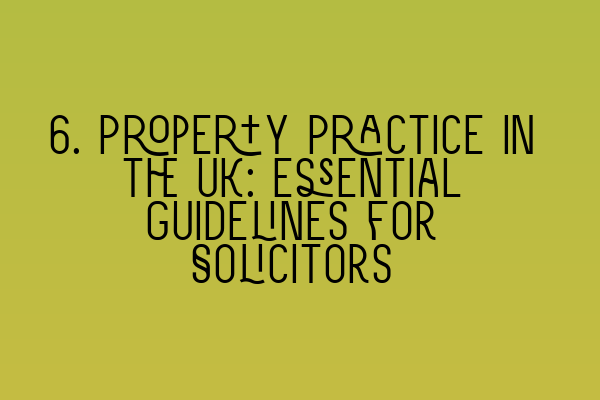Property Practice in the UK: Essential Guidelines for Solicitors
As a solicitor specializing in property law, it is crucial to have a thorough understanding of the complexities and intricacies of property practice in the UK. From residential conveyancing to commercial leases, the field encompasses a wide range of legal matters that require attention to detail and expertise.
In this comprehensive guide, we will outline the essential guidelines for solicitors practicing property law in the UK. Whether you are a seasoned professional or just starting your legal career, these tips will help you navigate through the challenges and provide top-notch service to your clients.
1. Stay Updated with New Legislation and Case Law
Property law is constantly evolving, with new legislation and case law shaping the legal landscape. To be an effective solicitor, it is crucial to stay up to date with these developments. Regularly review updates from authoritative sources such as the UK Courts and Tribunals and HM Land Registry.
Additionally, consider attending relevant webinars, seminars, and conferences to enhance your knowledge and understanding of the latest changes in property law. Being informed about recent developments will enable you to provide the most accurate and relevant advice to your clients.
2. Develop Strong Research and Analytical Skills
Property law often requires extensive research and analysis. As a solicitor, it is essential to develop strong research skills to efficiently gather and interpret relevant information. Familiarize yourself with online legal research tools like LexisNexis or Westlaw UK to access case law, statutes, and legal commentary.
Furthermore, enhance your analytical skills by critically analyzing legal principles and applying them to specific scenarios. The ability to identify key issues, evaluate different perspectives, and provide well-reasoned advice is crucial in property practice.
3. Attention to Detail in Documentation
When it comes to property law, attention to detail is of utmost importance. From drafting contracts to reviewing leases, even the smallest oversight can have significant consequences for your clients. Take the time to meticulously review and proofread all documentation to ensure accuracy and clarity.
Consider utilizing software tools like Clio or LawPro that can assist in streamlining document creation and management processes. These tools can help you create professional and error-free legal documents while saving time and effort.
4. Effective Communication with Clients
Clear and effective communication is vital in property practice. As a solicitor, it is crucial to communicate complex legal concepts to clients in a way that they can understand. Avoid legal jargon and use plain language when explaining legal matters to your clients.
Additionally, be responsive to your clients’ inquiries and keep them regularly informed about the progress of their cases. Maintaining open lines of communication will build trust and confidence in your services, ultimately leading to satisfied clients.
5. Collaborate with Other Professionals
Property transactions often involve the collaboration with other professionals such as surveyors, mortgage advisors, and lenders. Building strong relationships with these professionals can enhance the efficiency and effectiveness of your services.
Establishing a network of reliable contacts can help you connect clients with trusted professionals and facilitate smoother transactions. Regularly attend industry events and join professional organizations such as the Royal Institution of Chartered Surveyors (RICS) to expand your professional network.
6. Continuous Professional Development
To excel in property practice, it is important to invest in continuous professional development. Stay updated with relevant training courses and workshops, specifically tailored for property law professionals.
The Solicitors Qualifying Examination (SQE) also provides an opportunity to enhance your knowledge and showcase your expertise in property law. Prepare for the SQE exams by taking advantage of resources like SQE 1 Practice Exam Questions and participating in SQE 1 Practice Mocks FLK1 FLK2.
Additionally, consider enrolling in SQE 2 Preparation Courses or SQE 1 Preparation Courses to enhance your knowledge and improve your chances of success in the SQE exams.
Conclusion
Successfully navigating property practice in the UK requires a combination of technical expertise, effective communication, and continuous professional development. By staying updated with the latest legislation, enhancing research and analytical skills, paying meticulous attention to detail, and fostering strong professional relationships, you can provide top-quality service to your clients.
Remember, your success as a solicitor in property law rests not only on your legal knowledge but also on your ability to effectively serve your clients’ needs.
For more information on SQE exams and important dates, visit SRA SQE Exam Dates.
